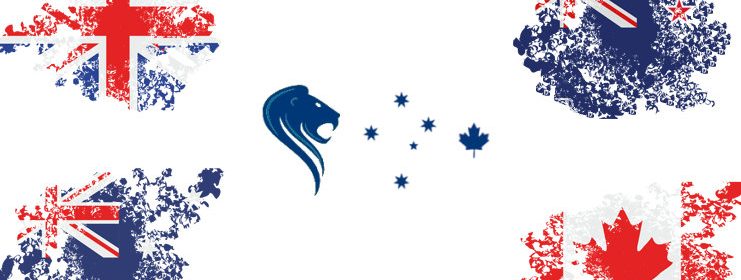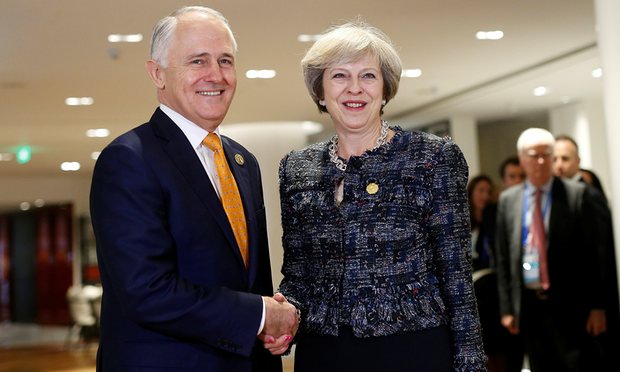Australia Angloceltic trade with Britain makes sense over EU globalism

Angloceltic birds of a feather…
Anglo traditionalists Australia and Britain are set to establish the first bilateral Trade Working Group since Brexit, commencing early 2017.
The purpose of being ready to fast-track free trade negotiations once Britain formally leaves the European Union.
The announcement was made following talks in London between Australian Trade Minister Steve Ciobo and UK Secretary of State for International Trade Liam Fox.
In a joint statement, Mr Fox and Mr Ciobo said: “Both of us want a future FTA (free trade agreement) to generate new trade and investment opportunities. We will prioritise consultation and outreach to our respective stakeholders to seek their input to the work of the Working Group”.
British Prime Minister Theresa May has used Australia as an example of one of the nations keen to strike a free trade deal with the UK post-Brexit.
But the reality is it could be years before any deal is done.
Such a trade deal is so more straight forward that rummaging through the red tape of 27 countries in the EU bloc.
Value Aussie coal, iron ore, wheat and wine enjoyed by Britain before Christmas!
Certainly, The Commonwealth Freedom of Movement Organisation wants to see unrestricted movement for citizens of Australia, Canada, New Zealand and the UK between nations.
Founder James Skinner claims to have “received significant support” from MPs and senators in each of the countries, who claim it would bring economic and social benefits. An online petition calling for a European Union-style freedom of movement arrangement has gained 162,000 signatures.
“If the European Union can incorporate freedom of movement for citizens of 28 member states (all of whom have different cultures, languages and ancestries), there is no reason why a free movement initiative between Australia, Canada, New Zealand and the United Kingdom could not be introduced.”
Mr Skinner claims the historical and cultural ties between the Commonwealth countries plus similarities in the legal and political system make it a no-brainer. Similar levels of economic growth, development, healthcare and quality of life added to the case that freedom of movement wouldn’t be a “brain drain” for any particular nation, he said.
“Citizens of these nations could therefore move freely without the risk of a migration exodus occurring, which causes negative consequences for all economies involved,” he said.
“One of the current problems with the European Union is citizens from less developed nations emigrating to more prosperous nations for employment opportunities and a better quality of life, causing a brain drain in the primary country and excessive immigration in the secondary country.
“With a free movement initiative between Australia, Canada, New Zealand and the United Kingdom, we would not see such migration patterns as all countries involved are similarly developed with exceptional qualities of life.”
Aussies would be free to move to Canada and vice versa under the proposals pushed by one lobby group. It’s one of a plethora of ideas fighting for oxygen in the post-Brexit debate as the UK works out what its relationship with Europe and the rest of the world will look like.
Earlier this month, Australian Foreign Minister Julie Bishop said free movement could be on the table as part of a future free-trade agreement with Britain now being explored.
“Should we be in a position to conclude a free-trade agreement after Brexit well then obviously [improved access] can be the subject of a free-trade agreement,” she said.
“It’s something we were able to achieve with the United States and I certainly look forward to increasing the number of business visas, student visas, work visas, between Australia and the UK.”
UK Foreign Secretary Boris Johnson, who has long been a champion of improved access for Australians in the UK and once called for a free labour mobility zone, praised the “almost glutinous” harmony between the two nations.
While he stopped short of endorsing free movement, he said it would be a “fantastic thing if we had a more sensible system”.
“You’ll remember the difficulties we had in recruiting paramedics … so this is something where I think we can make progress and I’m confident that we will,” he said.
It’s no secret that UK Foreign Secretary Boris Johnson is a big fan of Australia, but does he really want full access?
Young Aussies and Kiwis are said to be a fan of the plan, according to a survey from the Royal Commonwealth Society. Despite historical ties, the number of Australians living and working in the UK has fallen by 40 per cent since 2008 due to restrictions on migration.
Australia’s High Commissioner, Alexander Downer, has pushed for greater access and the move is supported by the majority of citizens in each country, according to a survey by the Royal Commonwealth Society.
It found in a YouGov poll earlier this year that 70 per cent of Australians, 75 per cent of Canadians, 82 per cent of New Zealanders and 58 per cent of Britons supported free mobility, with those aged between 18 and 35 in New Zealand and Australia most enthusiastic.
But with about 64 million people in the UK, 34 million in Canada, 24 million in Australia and just 4 million in New Zealand, how would such an arrangement work in reality?
Mr Skinner said the plan would be to create a “single labour market” to service the combined economy that would allow people to work and study freely. It could also be a boon to those frustrated by delays to family reunification.
“With free movement between these nations, families and loved ones would not require visas or work permits, and can be reunited without the cost and stress of arduous immigration controls,” he said.
Critics of freedom of movement say it reduces sovereignty over national borders and can allow terrorists and criminals to slip through undetected.
The idea would also have to overcome a major hurdle in public opinion revealed this week through the Essential Poll, which found 31 per cent of Australians feared a free trade deal that could make their jobs vulnerable to overseas workers.
It also showed bitter division on attitudes to Muslim immigration with 49 per cent of Australians supporting a ban on it altogether, while 40 per cent were opposed.



